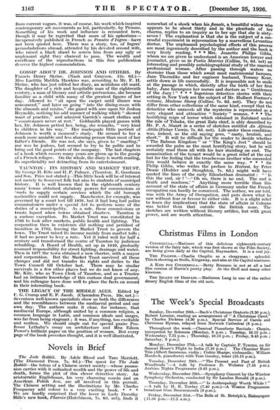Novels in Brief
The Jade Rabbit. By Adele Blood and Tam Marriott. (The Diamond Press. 7s. • 6d.)-The quest for The Jade Rabbit-the totem of a Chinese secret society-whose posses- sion carries with it unlimited wealth and the power of life and death, forms the .plot of this clever detective story. An aristocratic Englishman, his very charming cousin and an American _ Isolish Jew, are all involved in this pursuit. The Chinese setting and the illustrations by Mr. Charles Fouqueray add colour to a very exciting book. * * * We are hardly surprised that the lover in Lady Dorothy Mills's new book, Phoenix (Hutchinson, 7s. 6d. net),_ finds it somewhat of a shock when his fiancee, a beautiful widow who appears to be about thirty and in the plenitude of her charms, replies to an inquiry as to her age that she is sixty- seven ! The explanation is that she is the subject of a suc- cessful experiment in rejuvenation by a marvellous Levantine doctor. The unpleasant psychological effects of this process are most ingeniously described by the author and the book is very lively reading. * * * Mrs. Jeanette Philips Gibbs, whom we are given to understand is an American lawyer and journalist, gives us in Portia Marries (Collins, 7s. 6d. net) an interesting and possibly autobiographical study of the married professional woman. After passing through waters no stormier than those which await most matrimonial barques, Jane Thorndike and her engineer husband, Tommy Kent, settle down in life successfully. It is impossible not to mille at the passage in which, directly after the birth of her first baby, Jane harangues her nurses and doctors as " Gentlemen of the Jury ! " * * * Ingenious detective stories with their setting in New York are the subject of Mr. Hulbert Footner's volume, Madame Storey (Collins. 7s. 6d. net). They do not differ from other collections of the same kind, except that the detective who unravels all the mysteries is represented as a very elegant and attractive " Society " woman. * * * The horrifying reign of terror which obtained in Zululand under the rule of Tshaka, the great Zulu chief, is ably described by Mr. P. A. Stuart in a series of sketches entitled An African Attila (Fisher Unwin. 7s. 6d. net). Life under these conditions was, indeed, as the old saying goes, " nasty, brutish, and short." It will be difficult for the reader to decide whether " The Baboon Kingdom " or " The King's Jest " should be awarded the palm as the most horrifying story, but he will certainly read them all with his hair standing on end. The assassination of the tyrant would be a great relief at the end but for the feeling that the treacherous brother who succeeded him would behave in exactly the same way. * * * Sir Philip Gibbs, who writes the preface to Harvest, by Peter Deane (Hodder and Stoughton, 7s. 6d.) might well have quoted the lines of the early Elizabethan dramatist : " Is this the end, sir ? Oh no, there is no end. The end is death and madness.' " Anything more terrible than this account of the state of affairs in Germany under the French occupation can hardly be conceived. The author, we are told, was with the Army of Occupation, and puts down what he saw without fear or favour to either side. It is a slight relief to learn (by implication) that the state of affairs in Cologne was better than that outside the British zone. The sketches are written without literary artifice, but with great power, and are worth attention.


































 Previous page
Previous page